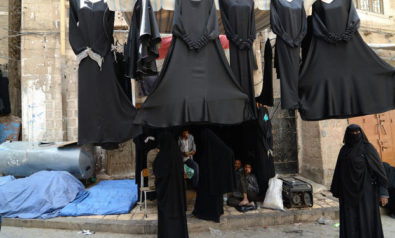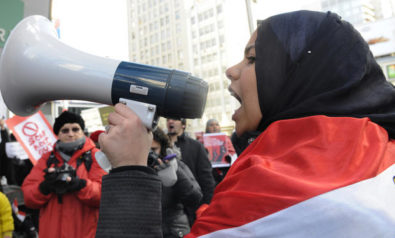Over two years since Mubarak was ousted, sexual harassment remains prevalent on the streets of Egypt.
It seems like yesterday when pictures and videos surfaced of an Egyptian protestor being dragged and beaten by military forces with her veil ripped off and her blue bra exposed. I was horrified by the image. Yet, I realized that this was just one pixel of the complicated picture of sexual harassment in Egypt and Tahrir Square. Combating the sexual harassment of women has remained unresolved since the 2011 revolution, where reported cases heightened during the Supreme Council of the Armed Force’s (SCAF) interim rule and under the regime of recently deposed President Mohammed Morsi.
From Mubarak to SCAF to Morsi, the Egyptian people have showed a relentless and unwavering commitment to change. Demonstrations continued and remained strong after Mubarak’s expulsion, as Egypt faced a severe economic crisis and were inflicted with heightening sectarian violence. As the possibility of sexual harassment in Tahrir Square became an imminent threat to Egyptian women, a group of individuals decided to bear the responsibility of protecting female protestors in Tahrir, seeing that the police and military had proven to be ineffective in doing so.
Tahrir Bodyguard and Operation Anti-Sexual Harassment
It started with one idea by Soraya Bahgat — the creation of Tahrir Bodyguard in 2012, where male and female volunteers, equipped in bright neon vests, work to prevent, stop and raise awareness of sexual harassment in Tahrir Square. The idea is practical and accessible. Witnesses who are unable to thwart a gang sexual assault can tweet the location to @TahrirBodyguard, where volunteers are immediately sent to respond. With a vast following from its creation, Tahrir Bodyguard also sends out notifications of alerts and of areas deemed dangerous.
Alongside the creation of Tahrir Bodyguard came the establishment of Operation Anti-Sexual Harassment (@OpAntiSH), in November 2012. OpAntiSH, like Tahrir Bodyguard, aims to prevent, stop and raise awareness of this issue in Tahrir and elsewhere. In addition, the organization provides legal, medical and psychological support to women who have been assaulted. Speaking with OpAntiSH’s media spokesperson, Engy Ghozlan, confirmed what I had been reading repeatedly since 2011. Asking her about the legality of sexual harassment cases, Ghozlan affirmed that: “Harassers, harass knowing that nothing will happen to them — neither socially nor legally.”
While laws can be adjusted dealing with this issue, only a transformation in the understanding and perception about sexual harassment and women’s role in society will generate true change. Until the government and the people stop continually blaming women for being harassed, laws will not be enforced. On February 11, 2013, General Adel Afifi, a member of the Shura Council’s Human Rights Committee, stated: “Girls who join [the protests] do so knowing they are in the middle of thugs and street types. She must protect herself before asking the Ministry of Interior to do so. Sometimes, a girl contributes 100% to her rape because she puts herself in those circumstances.”
As if it is discouraging enough to hear a member of a human rights committee waive this crippling issue that plagues Egypt, the UN Women report on Egypt, released in February 2013, reveals the appalling reality of many Egyptian women. The study, which aims to identify ways of reducing sexual harassment in Egypt, was conducted on 2,334 female respondents. Of those women, 99.3% reported to have been subjected to harassment in one form or another. To reiterate the lack of law enforcement on sexual harassment cases, 23.2% of the victims thought there was “no text in the law to penalize harassment.”
The Importance of Social Change
When cases of sexual harassment are repeatedly putting the blame on women, there is little initiative to transform the status quo among those who are socially and legally untouched for their actions. As Ghozlan told me, social change is more important right now than revising the law. In the same UN Women report, 43% of the women were scared to go out on the street again after a reoccurrence of harassment; 15.2% were afraid of the impact it would have on their reputation; and 7.8% of the women blamed themselves for going out in the street or to work. These statistics are disheartening in a nation that is fighting relentlessly for more representation, more rights, a stable economy and a balanced government. We have seen this engrained social standard extend from politicians to ordinary citizens.
Tahrir Bodyguard, OpAntiSH and other grassroots organizations are vital in combating the grim reality that women face in Egypt today. At least 91 cases of sexual harassment, including rape, have been documented between June 30 and July 3 in the demonstrations calling for the resignation of Morsi. On July 3, Human Rights Watch cited OpAntiSH, which confirmed 46 cases in Tahrir on June 30, 17 on July 1, and 23 on July 2. OpAntiSH had intervened in 31 of those cases. While these crimes are not new to Egypt or Tahrir Square, they have never been reported in such high numbers because “a lot of people are unwilling to come forward,” according to Bahgat. Gaining recognition on a national and international scale, OpAntiSH and Tahrir Bodyguard have bravely worked to tackle this problem in Tahrir and in Egypt as a whole.
With Morsi having been ousted by the military and replaced by Adly Mansour, the interim president and chief justice, Egypt’s future is met with uncertainty. Clashes between anti- and pro-Morsi factions have erupted throughout the country, as each fight for their representation.
Women on both sides, just as many other social and political groups, have demonstrated and expressed their determination to be equal members of Egyptian society. As social movements such as OpAntiSH and Tahrir Bodyguard work to put an end to sexual harassment, progress will ensue in promoting women’s representation in society and justice under the law. As their mission propagates throughout Egypt, these organizations, women, men, activists, and the international community must push Egypt’s future leaders to acknowledge and tackle this issue rigorously. Egypt’s revolutionary vigor must extend to fight this battle in hopes that one day, wrongdoers will be penalized under a system that enforces effective laws, women are no longer held accountable for being harassed, and women will be active contributors to a society where they are represented and protected.
The harassers and those who maintain the status quo should remember that their demands are weakened when they neglect matters that will severely obstruct an optimistic future for Egypt. When women are psychologically and physically blocked from being able to express their political concerns and marginalized under the law, it undermines the opportunity for a true democratic and representative process. When justice cannot be achieved on the streets of Cairo or during peaceful protests in Tahrir, many will find difficulty in finding justice in their leadership.
The views expressed in this article are the author’s own and do not necessarily reflect Fair Observer’s editorial policy.
Photo Credit: Gigi Ibrahim / Flickr
Support Fair Observer
We rely on your support for our independence, diversity and quality.
For more than 10 years, Fair Observer has been free, fair and independent. No billionaire owns us, no advertisers control us. We are a reader-supported nonprofit. Unlike many other publications, we keep our content free for readers regardless of where they live or whether they can afford to pay. We have no paywalls and no ads.
In the post-truth era of fake news, echo chambers and filter bubbles, we publish a plurality of perspectives from around the world. Anyone can publish with us, but everyone goes through a rigorous editorial process. So, you get fact-checked, well-reasoned content instead of noise.
We publish 2,500+ voices from 90+ countries. We also conduct education and training programs
on subjects ranging from digital media and journalism to writing and critical thinking. This
doesn’t come cheap. Servers, editors, trainers and web developers cost
money.
Please consider supporting us on a regular basis as a recurring donor or a
sustaining member.
Will you support FO’s journalism?
We rely on your support for our independence, diversity and quality.












Comment